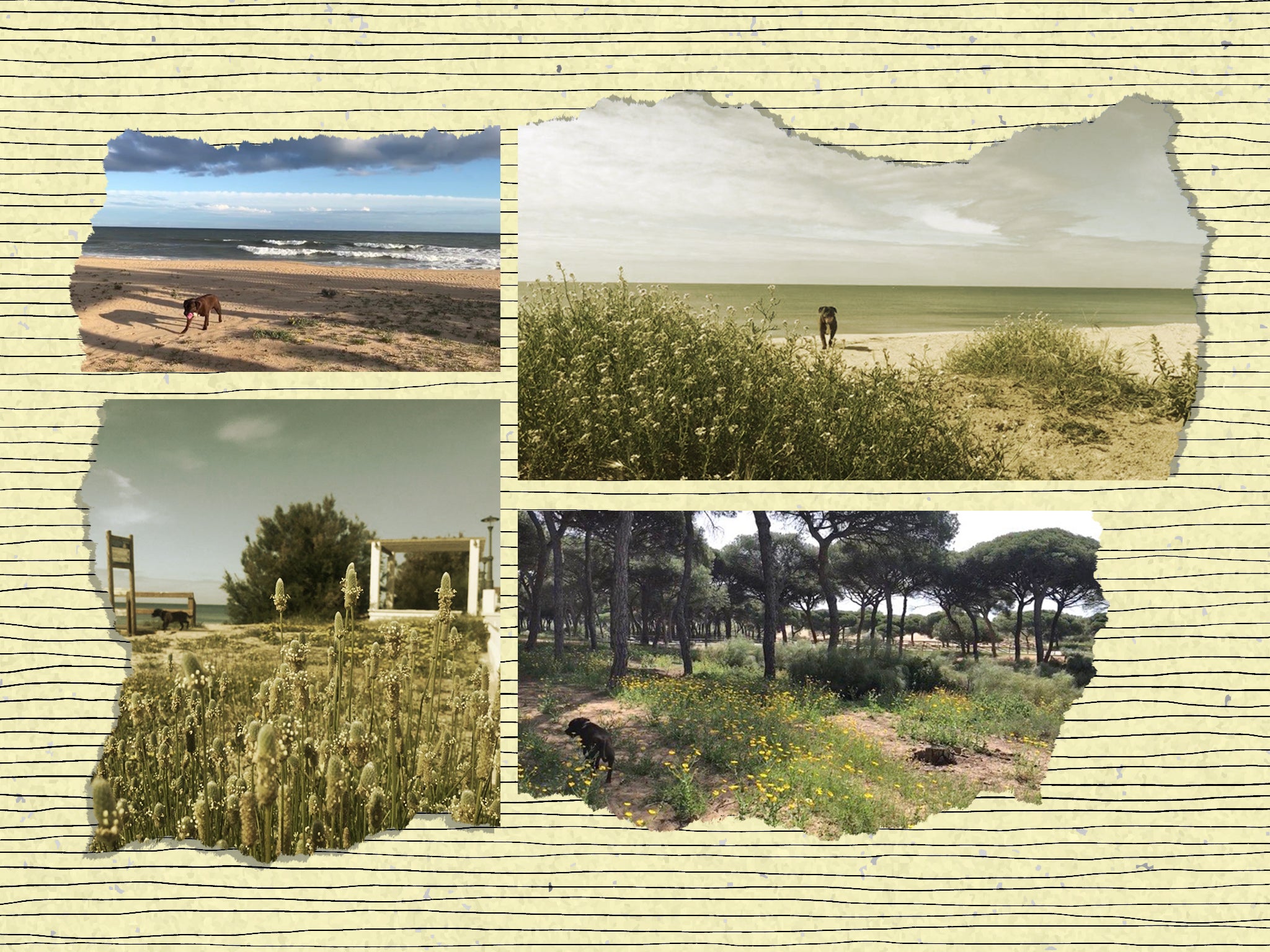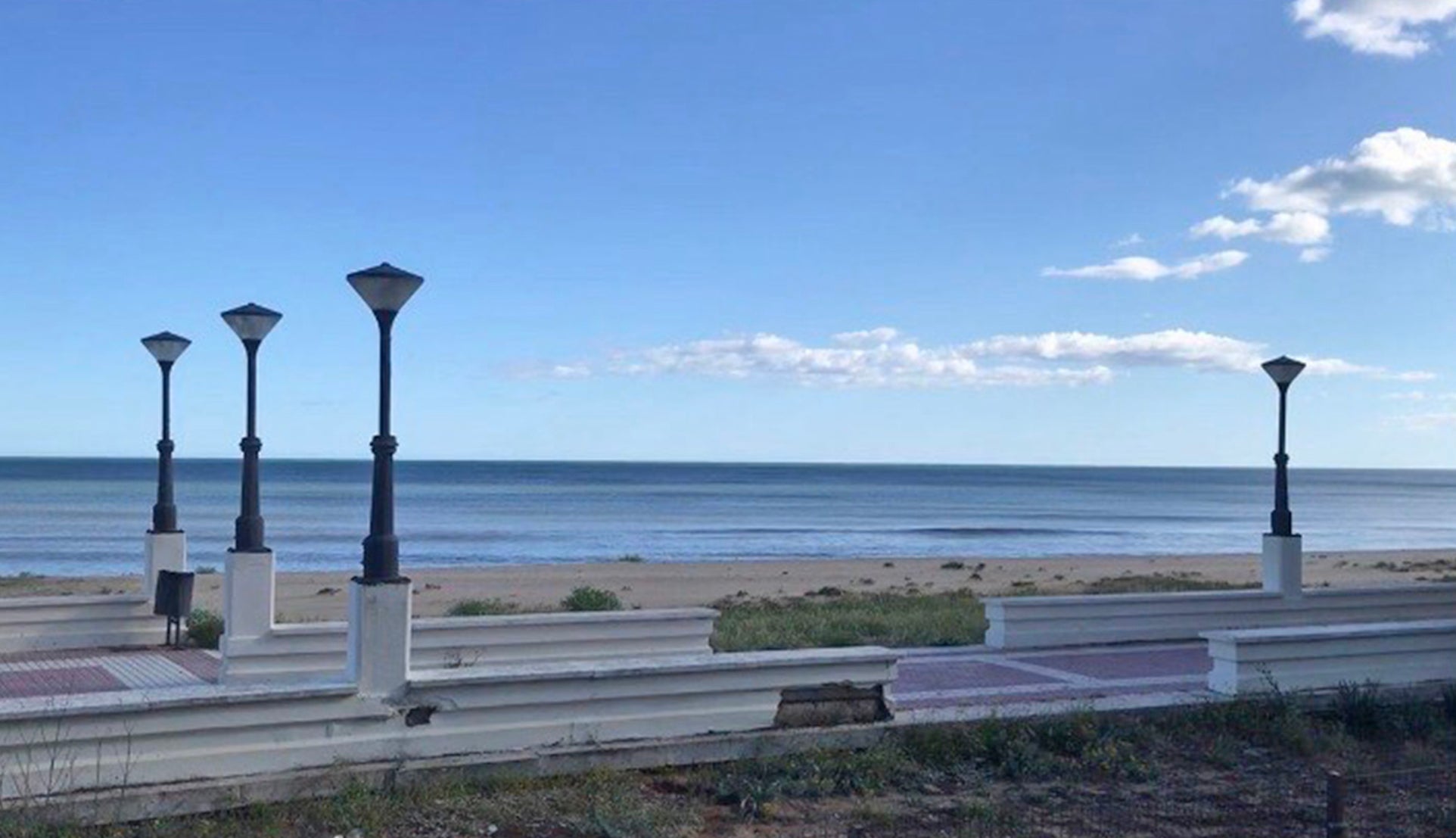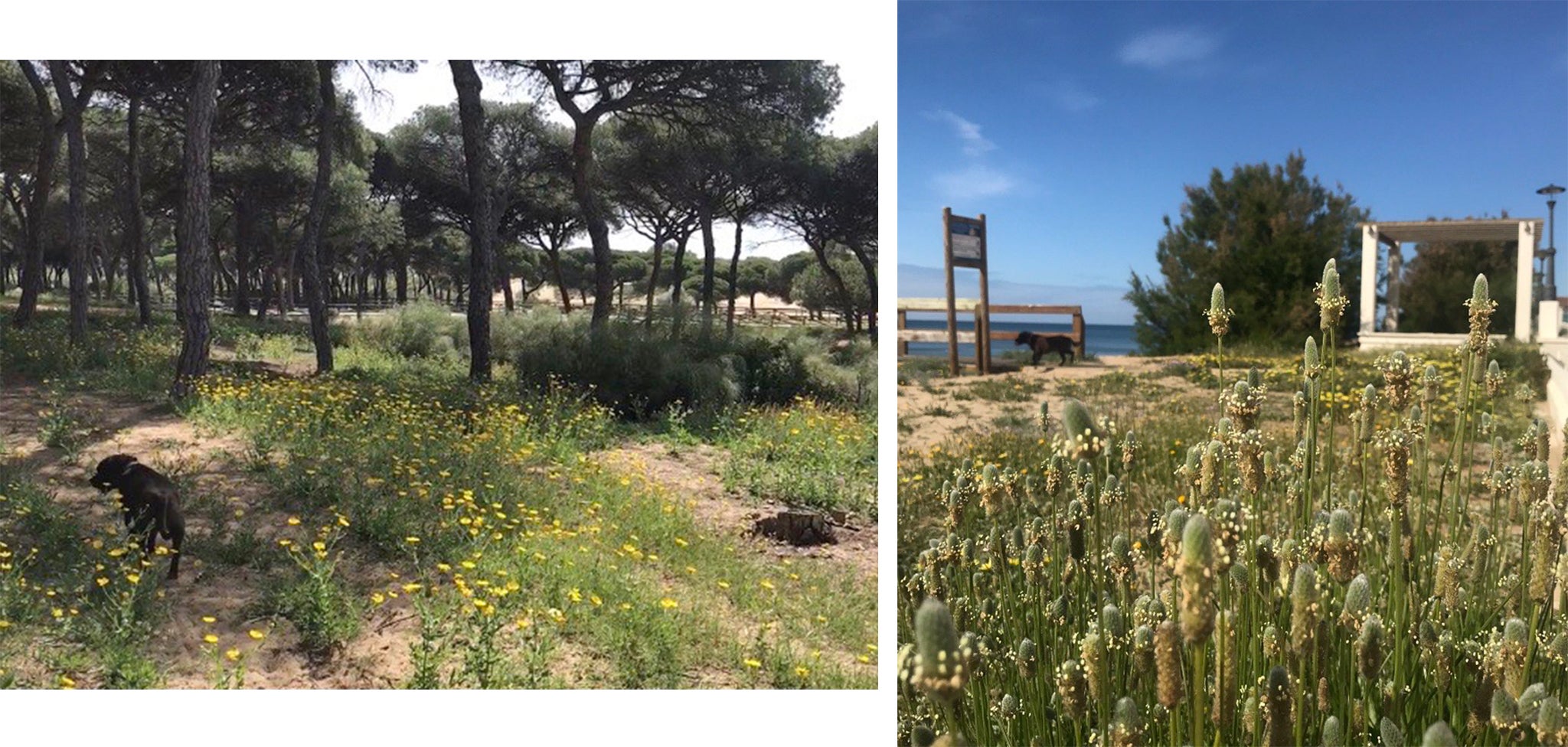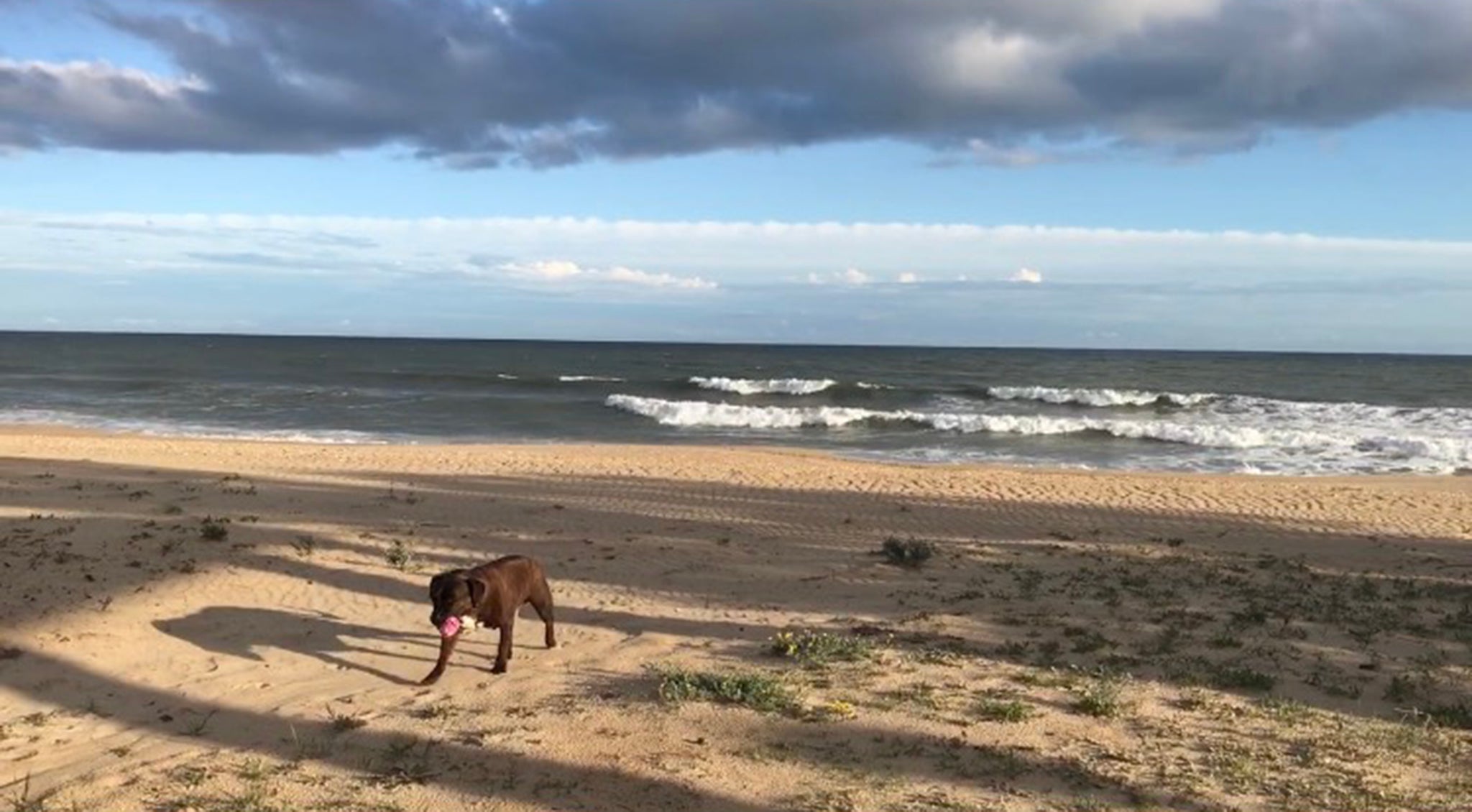The sound of silence: my Andalusian lockdown revisited
Lockdown fell mercilessly while Julian Machin was staying in a fishing village near the border with Portugal, cutting him off from his life in Seville. Together with his dog Ikaro, they watched the natural world burst into life around the deserted beach

It began on 16 March 2020, three days after a state of emergency was announced by megaphone from a moving police car. I remember sitting with my dog Ikaro on the low wall outside our holiday apartment, watching the sea and trying to take stock of the unsettling calm. The long beach was empty and the evening sun slanted on a group of seabirds silently taking stock. From the bushes and trees behind, the multiple lyrics of the usual finches and sparrows had expanded in the quiet around them. Ikaro, forever with his ball and my devoted companion, was my passport to relative freedom. This remote corner of Andalusia was a beautiful place in which to be marooned. The sea was a few metres distant, its marvellous rhythms a meditation on the acceptance of sorrow and the minimising of fear. There was an ever-changing and inspiring sky. The cessation of human activity was giving way to an exhalation of the natural world.
My Spanish partner, Jonatan, caught in Seville, assured me that being out with Ikaro was permitted, so I took to cycling along the winding beach path beneath its emerald canopy of mushroom pines. Already a section of downed police tape flapped like a wounded bird, giving access the beach. I continued in my habit of picking up plastic, noting how quickly litter levels decreased. Daily, I added to my collection of the shimmering, coloured shells so typical of the region. Paw and footprints in the sand were ours and ours alone. Many more birds – unknown to me – appeared and sounded ever more joyful. They dropped seeds of wildflowers on the beach that seemed to bloom almost overnight in the sand. Fish evidently approached the shallows in great numbers, bringing clouds of Audouin’s gulls who targeted them like arrows. Hedgehogs began shuffling casually up and down past my sitting room window, and now confident geckos and lizards ventured ever further. Nature was delighting in its newfound ability to gather and spread – the worldwide scale of which I discovered much later.

The wifi failed. Attempts to revive it were useless. There was no one else living in my block of 12 apartments. However, from the 70 flats in the edifice a little behind, only three of which were occupied, I managed to contact one couple living very high up, who gave me the password of the hotel further along the deserted paseo maritimo, in the hope that the internet there was left on. Under cover of darkness, I went to the covered patio of the hotel. The night was warm and the southern stars had already taken on a new, unpolluted clarity. Waves in rhythmic harmony ruffled the shore. The comforting prospect of watching a movie here on my tablet reminded me of having once attended an outdoor summer cinema in Grosvenor Square – with everyone in headphones whose little blue lights twinkled alluringly as streetlight filtered through the surround of London planes. It would be sad to be denied the internet in this magical setting and with no alternative. Suddenly the borderline stability of my situation seemed to depend on such a little thing. After an uneasy moment, the hotel network showed as available, and the password proved to be correct. Illicitly, after curfew, with Ikaro to cuddle, I regularly watched films under the stars against the background murmur of the Atlantic.
As if growing from the sea, there were stars so low on the horizon that I’d never before realised they were there; nor seen the moon so near or a shooting star so clear
My state of isolation, albeit with limited mobile data, could not be said to be going badly until one morning, on my tour through the mushroom pines, two men in a 4x4 drove out of the trees and confronted me on the path. They stood too close so I moved back, and then one pulled out a police badge. Asking if I was aware of the crisis, he said that I was too far from any house to be legally where they had found me. They issued no fine, which I later found out could have been punitive. But in future, only a short walk from home was permissible and never on the beach. How short, they did not say. The incident heralded a significant change in my mood.
The levant wind of the eastern Mediterranean whipped up. I watched it sporting with the sand outside my windows and longed to be cycling through its mad gusts. Wary now of being out too far with Ikaro, a good deal of his exercise was taken within the confines of our empty car park. I thought he would miss the sea terribly and decided to keep his brain occupied by focusing on ball games – learning new commands and then hand signals, and then the same commands in Spanish. He was so clever – and he knew it – and it was such simple pleasure for us both.

One incomparably beautiful evening, after reports of high Spanish mortality, I sat watching the early sunset over the sea. All I could tangibly think of was the myriad little crabs I used to rescue when high tide had beached them; my overriding sorrow was for not being able to do so again. That same night Ikaro and I went out to survey the beach and noticed by the water’s edge a figure who suddenly froze with fear. But as I carried neutrally on, he relaxed and lit a defiant cigarette. Not a word was exchanged. I left the figure to his solitude, but returned later, taking the darkest possible route across the beach to retrieve some ugly plastic whose presence there had been bothering me for days.
Much later, the unexpected sight and sound of children, released for the first time with a mask-wearing parent, came parading past the open windows. Ikaro barked at their unaccustomed presence. I couldn’t be sure that they registered the new, crystalline azure and turquoise sky or the improved air quality, and I winced when they just sat on the wall, not looking around them. It was a girl in a wheelchair who was first to appear to be enjoying the view around her. I sneaked out onto the beach that night too, collected more glinting plastic rubbish and also two beautiful giant clam shells. Late the following night, I took Ikaro to the beach and lay down just to look at the night sky. As if growing from the sea, there were stars so low on the horizon that I’d never before realised they were there; nor seen the moon so near or a shooting star so clear. It was a stunning display, unlikely to be much repeated in my lifetime. I thought of my grandfather, a master mariner, who’d have known these stars to steer by, whereas I couldn’t even name them, just as I couldn’t name the birds that I delighted in listening to by day.
Through my open windows, the sound of the sea was drowned out by the encroaching hum of Spain slowly getting back to work. Orders from the council had brought people with strimmers, methodically destroying all the wildflowers and grasses that had sprung to life since March
Eventually, the birdsong changed. There was less joyous chorus and more the staccato of alarm, with longer pauses in between. The energy had changed as, for the first time in almost two months, all people were allowed out within 1km of their homes.
Everyone including Ikaro could go back on the beach, and his joyful reaction to being allowed to leave the path again and canter right across the sand and into the sea was uncontained. But to me, it was many more days before I was allowed to finally leave the province to drive to Seville and reunite with Jonatan.

Meanwhile, through my open windows, the sound of the sea was drowned out by the encroaching hum of Spain slowly getting back to work. Orders from the council had brought people with strimmers, methodically destroying all the wildflowers and grasses that had sprung to life since March. I saw a brilliant green lizard dart hastily into a crack in the wall. The hedgehogs, insects, grass snakes, mice, and every creature who’d been flourishing would now have to retreat. The world was slowly returning to “normal”.
Recently, for the first time, I returned to Playa Ikaro – as I like to call it – and walked along the paseo maritimo past our old flat, which was all shuttered up. Blue patches in the sky over the western limit of Andalusia pierced a muddle of scudding clouds intent on racing to Portugal close by. Out of season, the cafe and the hotel were dormant, but not the same as before. Above the wind, the waves broke on the shore and fell away poignantly. I went down to the beach. The tide had raised a long, meandering fold of shells, from which I carefully selected four perfect ones in memory of Ikaro, who had died four months ago to the day.



Join our commenting forum
Join thought-provoking conversations, follow other Independent readers and see their replies
0Comments